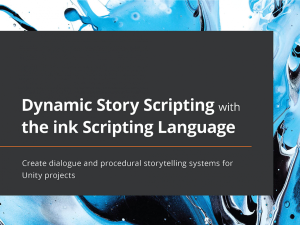
Daniel “Dan” Cox is a Ph.D. candidate and visiting instructor in the Games and Interactive Media (GaIM) program who teaches across both Game Design and Web and Social Platforms tracks.
He researches code pedagogy, which is how people learn to code and use this knowledge to complete different development tasks. He also studies programming textbooks and how they present topics as part of his research and teaching practices. The first textbook he wrote himself was published near the end of last year.
The book, “Hands-On Dynamic Story Scripting with the ink Scripting Language,” focuses on ink, a narrative scripting language designed for use with game engines such as Unity to help creators create story-driven projects.
“Before coming to UCF as a Ph.D. student, I had created a series of tutorial videos and online resources on an earlier version of ink,” wrote Cox. “One of the courses I taught had been using ink and I was able to refine my resources based on how my students used them. Last year, when I was contacted by the publisher, Packt, and asked about my interest in publishing a book on ink, I had already written a book-length project of about 30,000 words as part of an ‘unofficial cookbook’ on the topic. I was able to pull from both my teaching experiences and those resources to quickly create the book.”
The summary of the textbook explains how readers will be able to move from a simple story to an intricate Unity project using ink to power complex, branching narrative structures.
“The narrative scripting language ink seeks to solve a problem many digital projects encounter where they might want to present different choices to a player and then act on those choices,” said Cox. “As a scripting language, ink also provides a simple solution for narrative-based projects where all the story content can be written in an easier-to-read format and then combined via a plugin with a game engine like Unity. My book covers how to move from writing simple projects to using ink and Unity together to build complex projects like dynamic dialogue systems and story management projects where different files or parts of a story are loaded and unloaded in real-time.”
Cox received a Bachelor of Science degree in Computer Science in 2014 and a master’s degree in Rhetoric and Composition in 2017 from Old Dominion University. He is currently a Ph.D. candidate in the Texts and Technology program at UCF as well as a visiting instructor in the Games and Interactive Media program with a decade of experience creating online learning materials across interactive fiction tools such as Twine, Bitsy and ink.
Order this GaIM faculty’s first textbook here.
Published March 1, 2022. Written by Iulia Popescu.
If you have any news, accomplishments or highlights about your work or life, please be sure to share them with us, by emailing us at nicholsonews@ucf.edu.